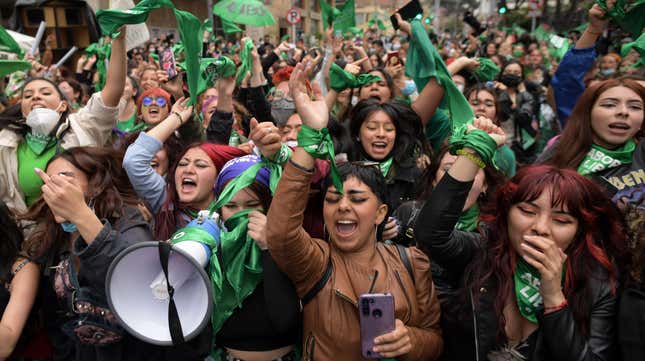The World Is Liberalizing Abortion Laws, But America Is Bent on Criminalization
Colombia's highest court decriminalized abortion on Monday, becoming the latest Latin American country to do so.
AbortionPolitics

The plaza outside Palacio de Justicia in Bogotá, Colombia was joyous on Monday. People wearing green bandanas—the symbol of the abortion rights movement in Latin America—crowded together shouting, crying and rejoicing. Kicking off this week, Colombia’s highest court ruled in favor of decriminalizing abortion up until 24 weeks of a pregnancy. The move makes Colombia the latest country to liberalize its abortion laws—almost in direct response to America’s continued push toward criminalization.
Since 2006, abortion had only been permitted in Colombia in cases of rape or incest or if the pregnant person’s health was at risk — meaning fetal abnormalities that would lead to death. Before that, the country had a total ban on the incredibly safe medical procedure.
“This ruling puts Colombia as the country with the most advanced legislation in the Americas,” Mariana Ardila, Women’s Link Worldwide managing attorney and one of the leading plaintiffs in the case in front of the court, said in a statement to Jezebel. “While this is a landmark decision for Colombia and for the surrounding region, Colombia’s Constitutional Court missed an excellent opportunity to be at the forefront of the world by regulating abortion outside of criminal law and to treat it as a public health issue.”
-

-

-

-

-

-

-

-

-

-

-

-

-

-

-

-

-

-

-

-

-

-

-

-

-

-

-

-

-

-

-

-

-

-

-

-

-

-

-

-








































